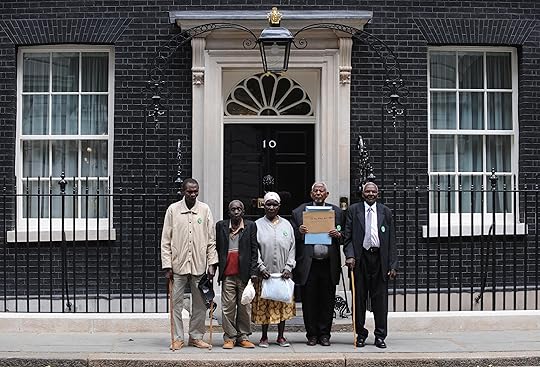Mau Mau and Toothfish
In the same week that the US attorney general, Eric Holder, announced that "key suspects" detained at Guantánamo would be tried through controversial military commissions, rather than in federal court—blaming members of Congress for intervening and imposing restrictions that blocked the administration from bringing any Guantánamo detainees to trial in the US—Great Britain, another champion enforcer of human rights across the globe, will be "invoking an obscure legal principle to dismiss claims of torture and rape by the British colonial administration in Kenya." The obscure law, on which the Foreign Office is set to argue its non-liability, is based "on a rule derived from a case over licences to fish for Patagonian toothfish in the South Georgia and South Sandwich islands, British overseas territories," which states that responsibility for acts committed by a colonial government pass to the new, successor government at independence. You read that correctly.
Pity the British Colonial administration didn't think of transporting detainees to a legal black hole like Guantánamo. But perhaps they believed their colonies were black holes, in which those highly-touted tea-and-biscuits civilised British values should not apply.
Four "elderly Kenyans," who survived the notorious detention camps, brought a case against the British Government last year, "alleging that they suffered serious physical and sexual abuse at the hands of the British during the Kenyan "emergency" of 1952 to 1960." This week, "Highly embarrassing colonial-era files," hitherto withheld by the from the Kenyan government, "detailing the British army's repressive tactics against Mau Mau insurgents in Kenya during the 1950s will be revealed" in this landmark compensation case. It could lead to the release of documents relating to other colonies once controlled by the UK. Daniel Leader, a lawyer at Leigh Day, representing the four current claimants, said:
"The nature and scale of this abuse was unparalleled in modern British colonial history. The claimants are among the poorest in Kenyan society, and they still live with injuries from that period."
Leader also illustrates that "the use of systematic violence was authorised at the highest level in London." His law firm has "the documents to prove that."
This case could open the way for up to 12,000 Kenyans who were similarly detained and abused to seek redress, but the Foreign Office claims that it "should not be allowed to proceed…because of the law of state succession," and because the Kenyan government is responsible for the abuses that actually took place under the British colonial administration (pre-independence), despite the fact that a Kenyan government did not, then, exist:
The government argues it is "not liable for the acts and omissions of the Kenyan colonial administration", claiming the Kenyan government was now responsible for events that took place while Kenya was a British colony.
The FCO letter also alludes the fact that colonial administrations transferred files containing "sensitive" information to the UK shortly before independence, and "select documents that "were not appropriate to hand on to the successor government" were routinely "withdraw[n] or destroy[ed]…prior to independence." The letter also spells out other fears: should these records be retuned, there is the "danger that we should find ourselves under constant pressure to make good other gaps … in the record of the Kenya government."
Whilst "a cross-party group of MPs will this week publish an open letter demanding an apology and the creation of a welfare fund to help the alleged victims through old age," I doubt that castration (for "supplying a cow to the Mau Mau"), forcing bottles filled with hot water into female detainees' vaginas, beatings so brutal that "sperms were coming out of my penis like a stream," arbitrary killings, routine sexual abuse, forced labour, starvation and regular violence from camp guards should be let go without a "real" legal process.
The taint of torture from the recent past only highlights how Britain has yet to reckon with abuses in the locations it exercises power—abuses repeated in the nation's participation in its more recent actions during the War on Terror—particularly in the secret "renditions" and torture of so-called "terror suspects" in new detention camps as notorious and horrific as those in which Kenyans were held.
At a time when the Arab Spring is being heralded around the world, the United States and Britain are busy using legal language to blanket their actions, rather than using their famous judicial systems to protect the bodies and psyches of those who have been simple instruments of colonial conquests.–Neelika Jayawardane








Sean Jacobs's Blog
- Sean Jacobs's profile
- 4 followers




